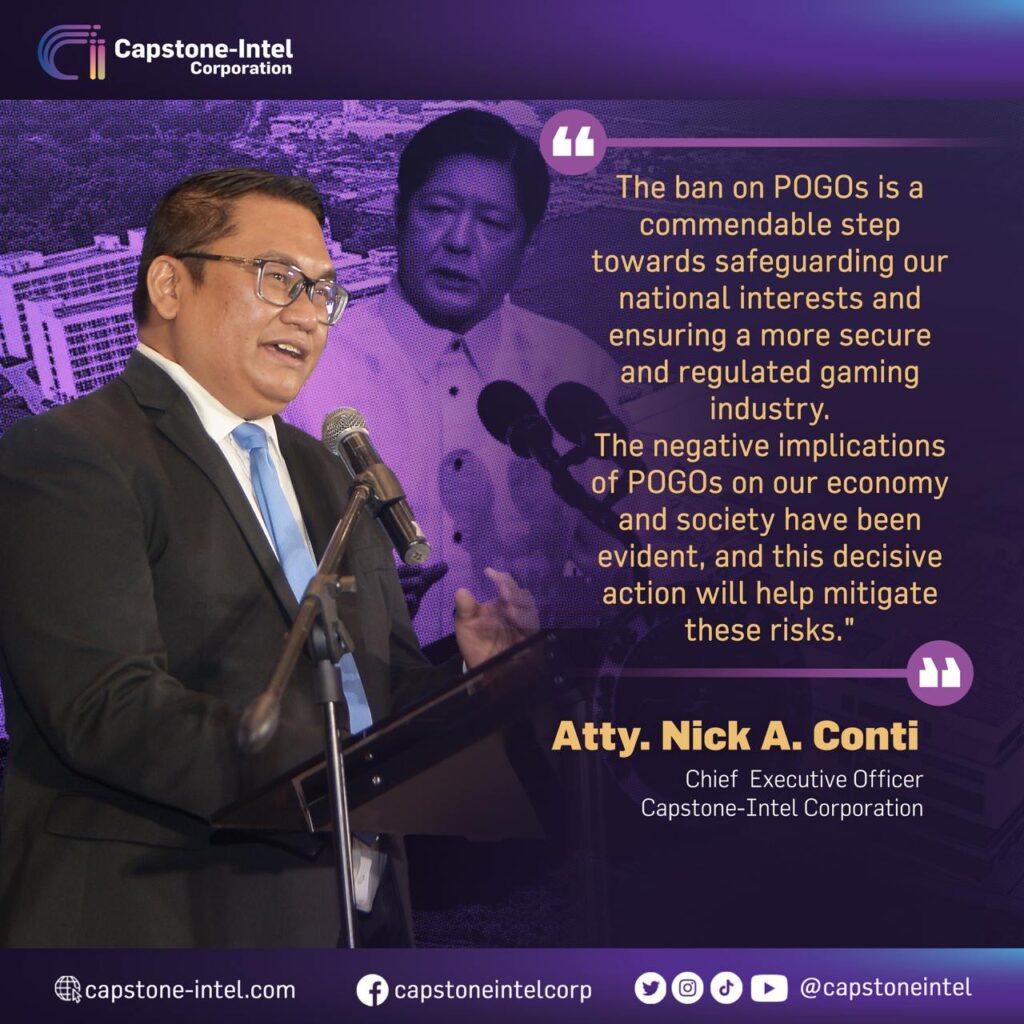The New Election Landscape in 2025 – Capstone-Intel
The post The New Election Landscape in 2025 appeared first on Capstone-Intel.

The post The New Election Landscape in 2025 appeared first on Capstone-Intel.
The former chief of the Presidential Anti-Graft Commission (PAGC) has called for a comprehensive audit of the country’s P245-billion budget for flood control projects for 2024 amid the massive flooding in the capital region following the onslaught of Super Typhoon Carina (international name Gaemi). Atty, Nicasio Conti, former commissioner of PAGC, now the chief executive officer of research firm Capstone-Intel Corp. said the current budget for flood control under the Department of Public Works and Highways (DPWH) has been raised from P185 billion in 2023, reflecting commitment to address the flooding issues. “The Filipino taxpayers are hit three times for paying for ineffective flood control projects, incurring personal losses during calamities, and funding the calamity response and rehabilitation efforts,” said Conti in a statement over the weekend. He stressed that public’s trust is undermined when these services fail to deliver, especially given the significant funds allocated for flood control. “The Filipino taxpayers deserve better public infrastructure services including effective flood control projects.” Conti said people pay taxes diligently in exchange for government programs and services, including safety and security during calamities such as typhoons and widespread flooding. However, the massive flooding in Metro Manila, Rizal and Bulacan highlights the mismanagement and possible corruption within these projects. “Due to the improper use and allocation of funds for flood control caused by corruption and substandard projects, taxpayers are short-changed,” he said. The misuse of funds leads to inadequate infrastructure that fails to protect the public effectively. Conti added that families affected by the massive flooding are faced with double whammy for additional costs of rehabilitating flooded homes, damaged properties, appliances, and vehicle. “The public not only suffers from the initial flood damage but also incurs additional expenses for rehabilitation and repairs,” he said. “What is worse is that despite the allocated funds to prevent flooding, these funds are not used properly,” said Conti. The taxpayers’ money is again used for the calamity fund and rehabilitation, thus, resulting to the three-fold burden of taxpayers. the burden thrice: paying for ineffective flood control projects, incurring personal losses, and funding the calamity response and rehabilitation efforts. Atty. Conti stressed that the flood control budget for the DPWH 2024 at ₱245 billion surpassed the overall budget allocation of key executive branches, highlighting the government’s prioritization of infrastructure resilience and disaster preparedness. To illustrate: Department of Labor and Employment Php 44. 8 billion Department of Environment and Natural Resources Php 25.4 billion Department of Justice Php 26.7 billion Department of Tourism Php 2.5 billion Department of Trade and Industry Php 24.4 billion Department of Energy Php 2.2 billion Department of Science and Technology Php 24.1 billion Department of Information and Communications Technology Php 10.8 billion Department of Foreign Affairs Php 24.2 billion Department of Finance Php 32.9 billion Department of Budget and Management Php 2.5 billion Department of Agrarian Reform Php 9.3 billion **** For more information and interview opportunities regarding surveys, you may contact Capstone-Intel’s Research and Publications Director, Ella Kristina Domingo-Coronel at 09565711298. Capstone-Intel is a high-impact research company that uses innovative research technologies, tools, and methods to convert data and information into breakthrough insights and actionable intelligence outputs. It is committed to helping its clients solve problems, find solutions, grow markets and constituencies, build reputations, navigate risks, manage crises, and be the country’s leading private research and intelligence agency.
The post Former anti-graft chief seeks audit of P245 billion flood control projects amid Metro’s massive flooding appeared first on Capstone-Intel.

The former chief of the Presidential Anti-Graft Commission (PAGC) said the government can offset the potential revenue losses from the operations of Philippine Offshore Gaming Operators (POGOs) by allowing gaming Business Process Outsourcing in export processing zones to enpolsure strict regulations. Atty. Nicasio Conti, former head of PAGC, now chief executive officer of Capstone-Intel Corp. lauded the decision of President Bongbong Marcos’ decision to ban POGO operations as it has led to serious crimes of trafficking, kidnapping, tax evasion and other national security concerns. “The ban on POGOs is a commendable step towards safeguarding our national interests and ensuring a more secure and regulated gaming industry,” said Conti. He added that, “the negative implications of POGOs on our economy and society have been evident, and this decisive action will help mitigate these risks.” Conti was reacting to the concerns raised by Albay 2nd District Rep. Joey Salceda on the potential revenue losses from POGO operations. He proposed a strategic shift towards allowing gaming BPO operations in Cagayan Economic Zone Authority (CEZA), the Authority of the Freeport Area of Bataan (AFAB) and the Aurora Pacific Economic Zone and Freeport (APECO). These government-attached agencies have separate mandates from PAGCOR. The former cabinet official explained that gaming BPO in export processing zones can be regulated since these areas are considered as “controlled environments.” “The transition to gaming BPOs within designated Economic Zones can offset the revenue loss from POGOs. These zones are equipped to handle such operations efficiently and with greater regulatory oversight,” Conti explained in a press release on Wednesday. Conti said PAGCOR must step up monitoring and regulations, should it decide to issue licenses and allow Philippine Inland Gaming Operators (PIGOs). Earlier, Conti calls for the strict prohibition of gambling advertisements across all platforms to mitigate the social impact of gambling within the country. “If PAGCOR continues to oversee PIGOs, there must be rigorous monitoring and enforcement of regulations to ensure compliance. Additionally, gambling advertisements should be strictly banned in all media to protect our citizens from the potential harms of gambling,” he said.
The post Former Anti-graft chief seeks regulated gaming BPOs to offset POGO revenues appeared first on Capstone-Intel.